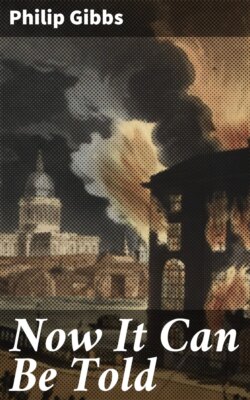Читать книгу Now It Can Be Told - Philip Gibbs - Страница 33
На сайте Литреса книга снята с продажи.
II
ОглавлениеTable of Contents
The New Army was called into being by Lord Kitchener and his advisers, who adopted modern advertising methods to stir the sluggish imagination of the masses, so that every wall in London and great cities, every fence in rural places, was placarded with picture-posters.
… “What did you do in the Great War, Daddy?” … “What will your best girl say if you're not in khaki?”
Those were vulgar appeals which, no doubt, stirred many simple souls, and so were good enough. It would have been better to let the people know more of the truth of what was happening in France and Flanders—the truth of tragedy, instead of carefully camouflaged communiques, hiding the losses, ignoring the deeds of famous regiments, veiling all the drama of that early fighting by a deliberate screen of mystery, though all was known to the enemy. It was fear of their own people, not of the enemy, which guided the rules of censorship then and later.
For some little time the British people did not understand what was happening. How could they know? It appeared that all was going well. Then why worry? Soon there would be the joy-bells of peace, and the boys would come marching home again, as in earlier wars. It was only very slowly—because of the conspiracy of silence—that there crept into the consciousness of our people the dim realization of a desperate struggle ahead, in which all their young manhood would be needed to save France and Belgium, and—dear God!—England herself. It was as that thought touched one mind and another that the recruiting offices were crowded with young men. Some of them offered their bodies because of the promise of a great adventure—and life had been rather dull in office and factory and on the farm. Something stirred in their blood—an old call to youth. Some instinct of a primitive, savage kind, for open-air life, fighting, killing, the comradeship of hunters, violent emotions, the chance of death, surged up into the brains of quiet boys, clerks, mechanics, miners, factory hands. It was the call of the wild—the hark-back of the mind to the old barbarities of the world's dawn, which is in the embryo of modern man. The shock of anger at frightful tales from Belgium—little children with their hands cut off (no evidence for that one); women foully outraged; civilians shot in cold blood—sent many men at a quick pace to the recruiting agents. Others were sent there by the taunt of a girl, or the sneer of a comrade in khaki, or the straight, steady look in the eyes of a father who said, “What about it, Dick? … The old country is up against it.” It was that last thought which worked in the brain of England's manhood. That was his real call, which whispered to men at the plow—quiet, ruminating lads, the peasant type, the yeoman—and excited undergraduates in their rooms at Oxford and Cambridge, and the masters of public schools, and all manner of young men, and some, as I know, old in years but young in heart. “The old country is in danger!” The shadow of a menace was creeping over some little patch of England—or of Scotland.
“I's best be going,” said the village boy.
“'Dulce et decorum est—'” said the undergraduate.
“I hate the idea, but it's got to be done,” said the city—bred man.
So they disappeared from their familiar haunts—more and more of them as the months passed. They were put into training-camps, “pigged” it on dirty straw in dirty barns, were ill-fed and ill-equipped, and trained by hard—mouthed sergeants—tyrants and bullies in a good cause—until they became automata at the word of command, lost their souls, as it seemed, in that grinding-machine of military training, and cursed their fate. Only comradeship helped them—not always jolly, if they happened to be a class above their fellows, a moral peg above foul-mouthed slum-dwellers and men of filthy habits, but splendid if they were in their own crowd of decent, laughter-loving, companionable lads. Eleven months' training! Were they ever going to the front? The war would be over before they landed in France … Then, at last, they came.
